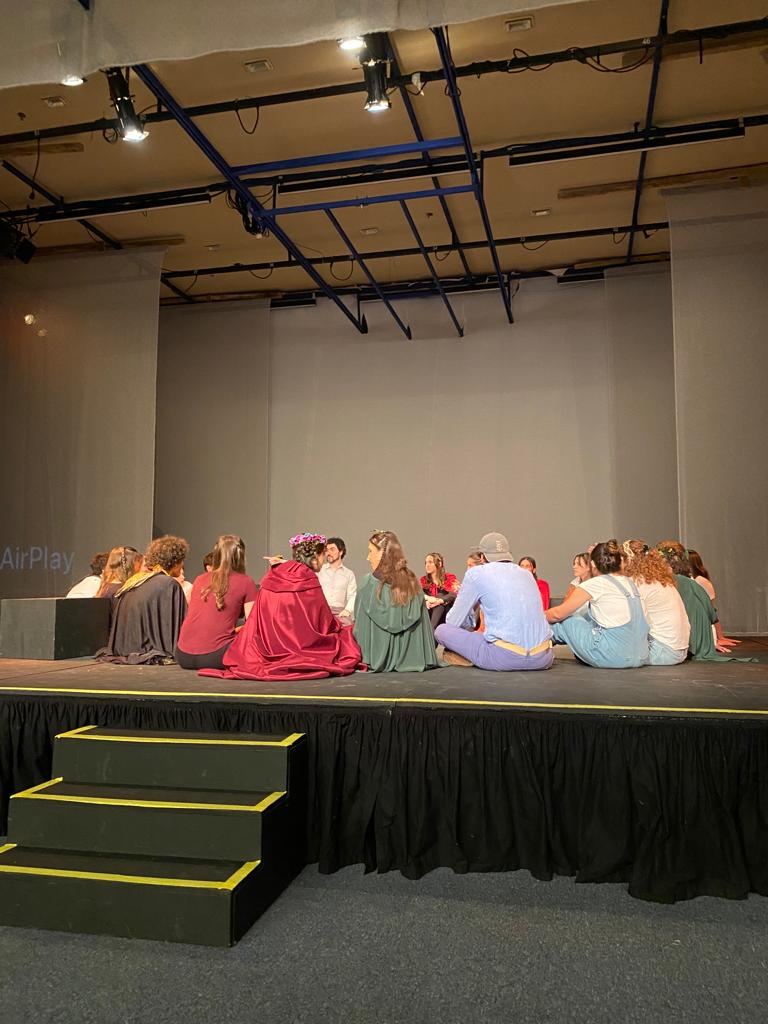|
By A. Gomes and S. Franco From the perspective of both audience and actor alike, A Midsummer Night's Dream was among some of the favorite performances that have been put on here at St. Paul's School. Between the play's acting, singing, production, and engaging plot, the performance was enjoyable to watch and delightful to be in! However, the process of putting it together was not exempt from challenges. Our 2022 – 2023 academic year began online, due to an unfortunate viral contamination, which consequently delayed the beginning of the school play audition process. Following this, several of our usual Saturday rehearsals were cancelled or shifted due to the Brazilian elections and an educational conference taking place here at school. All this without mentioning that the performance dates had to be anticipated by a week as a result of the start of the FIFA World Cup that occurred on the 20th of November. This all culminated in us having very little time to prepare the piece.
It was necessary to spend the first month of rehearsals adapting the Shakespearean script into language that was slightly more comprehensible. Henceforth, the beginning of rehearsals developed slowly, with the cast initially being divided into three different groups according to their characters. This separation felt very different to the whole-cast unity we are typically accustomed to in the school play. Nevertheless, once the script was done, it seemed like everything came together, as the cast was able to physically explore their roles, work together as one, and interact with some elements of design such as lighting, costumes, projections and music. Soon enough, we could no longer imagine our weekdays and weekends not being dedicated to preparing for a production that we quickly began to refer to as Our Dream. Despite the eventual adoration that the cast developed for Our Dream, it must also be noted that when the play was first announced, many of us were hesitant. Having studied this particular Shakespearean piece in English lessons, we were trapped into the notion that Shakespeare performances can only really be done in one way, which has been repeated unceasingly throughout time, and which both audience and actor have grown tired of. This is what infamous theatre director Peter Brook would deem Deadly Theatre; a theatre that is rid of innovation, creativity and inspiration, and rather is plagued by mental blocks we ourselves implement of how theatre "should" look. Therefore, we quickly rid ourselves of this mindset and embarked on a memorable journey of making the play our own, as we aim to do with any school production. From the humor-filled scenes of the Players, to Lysander and Demetrius' British accents, to Oberon's recitation of the spell from Disney's Tangled, we can state with confidence that our performance of A Midsummer Night's Dream was like no other, and one we are proud of calling our own. This taught us all the very important lesson that there is no formula for the living entity that is theatre - it must be created only through emotion and imagination. Because of the pandemic, this year's production welcomed a cast that had not physically acted with each other for a very long time. While many actors had taken part in the 2019 production of “Groundhog Day”, as well as last year's “Domino Effect,” this year there was a plethora of new students, either to the school, or who had never participated in the play before. Through the rehearsal process, however, we were all able to form a united cast, and become close friends, which is what allowed us to so successfully translate the work of Shakespeare into a modern context. Without this cast, A Midsummer Night’s Dream would not be even close to the finished product we were able to present. As the play has come to an end, we as a cast have been left anxiously waiting to see what project is in store for us next year. That said, A Midsummer Night’s Dream also symbolized the end of an era, as we had to say goodbye to the Upper Sixths, Benjamin Mizne and Ignácio de Cardenas, who have made incredible contributions to theatre in St. Paul’s for years and will be immensely missed. Even with this melancholy end to the Upper Sixth’s participation in theatre, we as a cast could not have thought of a better way to go. We, albeit with immense struggle, were able to take one of the most famous plays in history and make it our own, something that we know everyone in our cast is inexplicably proud of. Through all the turbulence during the pandemic which affected the very core of the play in St. Paul’s, that of human interaction, A Midsummer Night’s Dream was the perfect reintroduction to the talent and passion of the students in the Senior School, truly confirming that the future of theatre at the school is in safe hands in spite of our leavers.
0 Comments
Your comment will be posted after it is approved.
Leave a Reply. |

